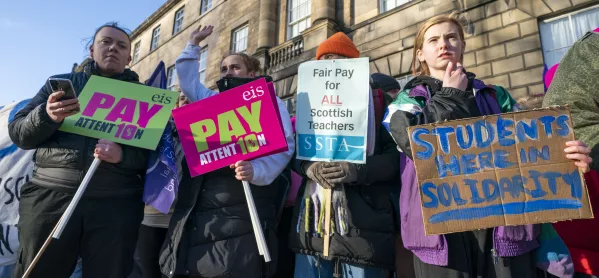The EIS teaching union has announced 22 more days of strikes in the ongoing pay dispute.
It said the new strike days are in addition to the previously announced 16-day programme of rolling strike action, due to begin in schools across the country next week.
The EIS executive committee met today and agreed action that will include two days of strikes in all schools and sectors on 28 February and 1 March, followed by a rolling programme of strikes for 20 days between 13 March and 21 April.
Each local authority area will see three consecutive days of strikes, with one day affecting all schools bookended on either side by one-day strikes in primary and secondary schools.
After the first national teacher pay strike since the mid-1980s took place in November, the EIS took further action this week. Schools were closed on Tuesday, when the focus was on primaries, and a day later secondary teachers led strike action.
Unions have been campaigning for a 10 per cent pay offer, but the most recent offered amounts to 5 per cent for the majority of teachers and 6.85 per cent at most for probationers.
Speaking after the meeting today, EIS general secretary Andrea Bradley said: “The programme of additional strike action, agreed today, is a direct response to the inaction of the Scottish government and [local authorities body] Cosla on teacher pay.
“After a year of dither, delay and disingenuity from the Scottish government and Cosla, Scotland’s teachers have simply had enough.”
Ms Bradley added: “The recent days of strike action by Scotland’s teachers have succeeded in bringing Cosla and the Scottish government back to the negotiating table but they have yet to put a single extra penny onto that table. Scotland’s teachers rejected a sub-inflationary 5 per cent offer six months ago, and little or no progress has been made in negotiations since.
“The prospect of 22 additional days of strike action, on top of the 16 days of rolling action set to begin next week, should signal clearly to the Scottish government and Cosla that they must now act with urgency.
“Our members are resolute and determined to secure a fair pay settlement, which both properly reflects their value and also takes account of the soaring cost of living.”
First minister Nicola Sturgeon has previously said: “We’re trying to be as fair as possible while maximising pay increases.”
In a bulletin today, Cosla said on teacher pay talks that there was “no additional funding available and that the financial pressures councils continue to face are still very much ongoing”.




